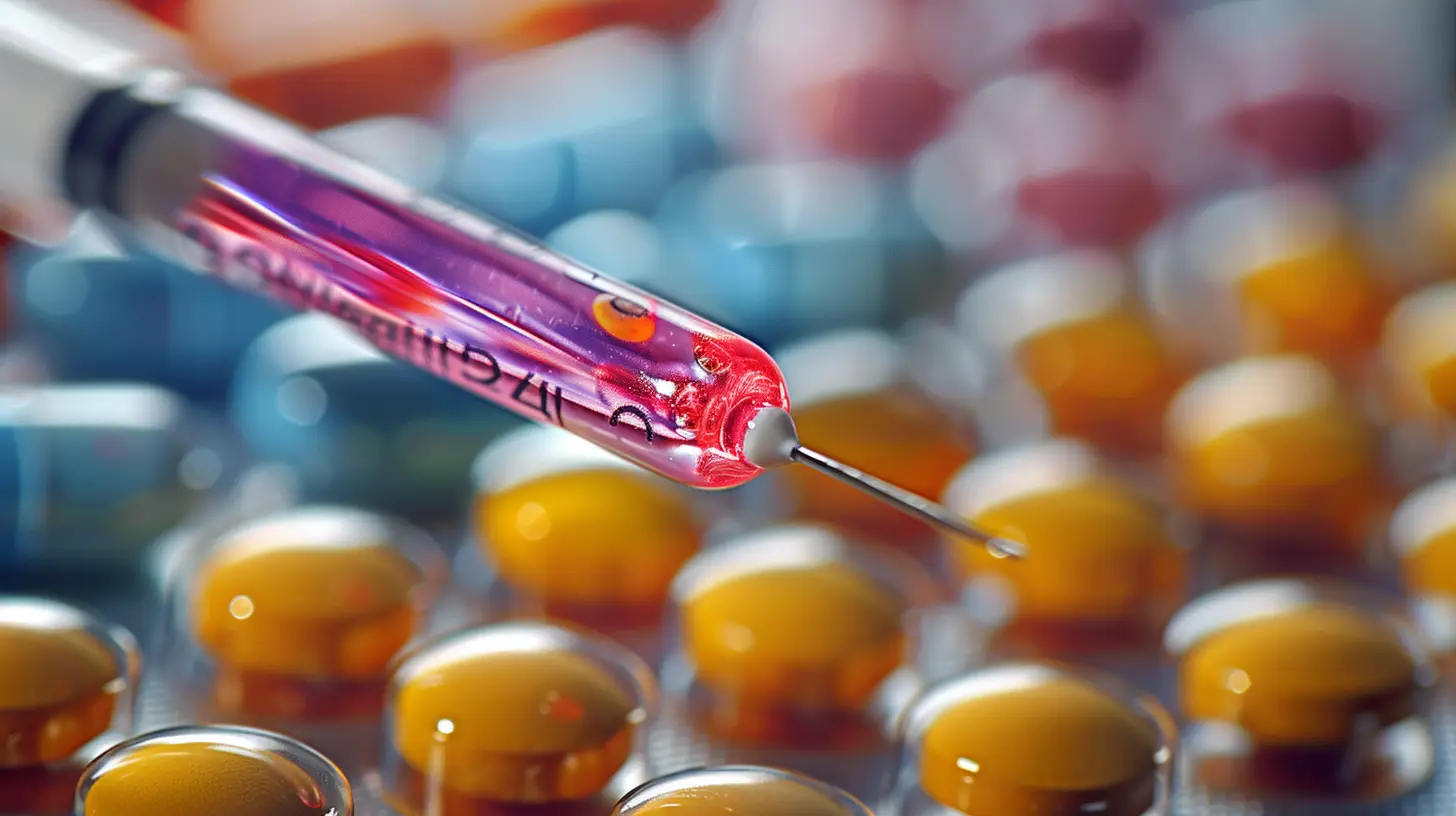The Ethics of Testing for Doping in Amateur Sports
6 January 2025
Doping in sports is nothing new. We’ve heard about it in professional leagues, the Olympics, and even in high school competitions. But when it comes to amateur sports, the conversation gets murkier. Sure, testing for performance-enhancing drugs (PEDs) in professional settings makes sense – there's big money, fame, and a lot on the line. But should the same scrutiny apply to amateur athletes, who are often just playing for passion, personal achievement, or to blow off steam after work?
When we dive into the ethics of testing for doping in amateur sports, a lot of questions pop up. Is it fair to subject amateur athletes to rigorous testing? What about their privacy? And does it even matter if someone is juicing up in a recreational league? Let’s break it down.

What Is Doping Anyway?
Before we get too far ahead, let’s quickly define what we’re talking about when we mention "doping". In simple terms, doping refers to the use of banned substances or methods that enhance athletic performance. This could be anything from anabolic steroids to something as seemingly innocent as caffeine (though you'd have to chug an absurd amount for it to be considered doping).The goal of doping is pretty straightforward: to get an unfair advantage. But when it comes to amateur sports, the stakes aren’t as high as the pros, right? Or are they?

The Stakes in Amateur Sports
At first glance, it might seem like amateur sports are just for fun. But let’s be real – anyone who’s played in a local league or even casually with friends knows that competition can get intense. Whether it’s the local 5K race, a weekend soccer tournament, or even a CrossFit competition, people want to win. And for some, the temptation to use performance-enhancing substances creeps in.But here’s the thing: the stakes in amateur sports aren’t just about winning a trophy or bragging rights. For many, amateur sports are a pathway to higher levels. Think about young athletes trying to get scholarships or make it to professional leagues. For them, doping could be a shortcut to success, but it also comes with risks to their health and credibility.
So, should we be testing these athletes? And if so, at what cost?

The Ethical Debate: To Test or Not to Test?
Fair Play vs Personal Freedom
One of the biggest arguments for testing in amateur sports is fairness. If someone’s doping, they have an unfair advantage over their competitors. Imagine you’re grinding it out at the gym day after day, eating right, and staying disciplined, only to lose to someone who’s been injecting steroids. That doesn’t exactly scream "fair play", does it?But here’s the flip side: testing for doping can feel like an invasion of privacy. Amateur athletes don’t have the same support systems or resources as professionals. Forcing them to undergo testing, possibly without their consent or understanding, can raise serious ethical questions about personal freedom. Should someone really have to pee in a cup after their weekend basketball game?
Health Risks and Protection
Another key argument in favor of testing is the health risks associated with doping. Performance-enhancing drugs can have dangerous side effects – heart problems, liver damage, and even psychological issues. In amateur sports, where athletes might not have access to the same medical oversight as pros, the risks are even higher.Testing could act as a deterrent, discouraging athletes from putting themselves in harm’s way. But again, where do we draw the line? Should we be testing high schoolers? College athletes? Weekend warriors?
Cost and Practicality
Then there's the question of cost. Testing for doping isn't cheap. Professional leagues and Olympic committees have the budget to run extensive tests, but local leagues and amateur competitions? Not so much. Implementing widespread testing could drain resources that could be better spent elsewhere – like on facilities, coaching, or youth programs.And let's not forget the logistics. How do you decide who gets tested? Random testing? Only after a certain level of competition? And who’s responsible for it? These are all practical concerns that make the ethics of doping in amateur sports more complicated than just “should we test or not?”

The Privacy Dilemma
Testing for doping isn’t just about whether or not it’s fair – it’s also about privacy. In professional sports, athletes often know what they’re getting into. They sign contracts, understand the rules, and are aware that testing is part of the job. But in amateur sports, athletes aren’t necessarily signing up for that level of scrutiny.Imagine being an amateur athlete, working a 9-to-5, and playing in a local league just for fun, only to be subjected to drug testing. It feels invasive, right? This leads us to the ethical question of where individual rights to privacy fit into the broader goal of maintaining a level playing field.
Consent and Awareness
Amateur athletes might not even be aware of what substances are banned. The World Anti-Doping Agency (WADA) has a giant list of prohibited substances, and keeping track of it is a full-time job in itself. Does the average amateur athlete know that certain over-the-counter medications could get them flagged? Probably not.Informed consent is a huge part of ethical testing. If athletes don’t understand what they’re being tested for or don’t have the resources to check every supplement they take, is it really fair to penalize them for a positive test?
Is Doping in Amateur Sports Really a Problem?
Okay, so we’ve talked about the ethics of testing, but is doping even that big of a deal in amateur sports? Well, it depends on who you ask.Some argue that doping is prevalent even at the lowest levels of competition. Sure, you might not see it in your local pickup basketball game, but in more serious amateur competitions, like bodybuilding, CrossFit, or even endurance sports, doping is a real issue.
Others will argue that in the grand scheme of things, amateur doping doesn’t matter that much. If someone wants to risk their health to win a local bike race, is that really society’s problem? The counterargument, of course, is that even in amateur sports, doping can create a toxic culture of dishonesty, unhealthy competition, and long-term health consequences.
Alternatives to Testing
If testing for doping in amateur sports raises so many ethical concerns, are there alternatives? Absolutely.Education and Prevention
One of the best ways to combat doping is through education. If athletes understand the risks associated with performance-enhancing drugs, they might be less likely to use them. Providing resources, workshops, and even online tutorials about the dangers of doping could go a long way in preventing it before it becomes a problem.Self-Regulation
Another potential solution is to encourage self-regulation. In some amateur leagues, athletes are encouraged to hold each other accountable. This could be through team policies, peer monitoring, or even a "no tolerance" culture within the sport itself.Testing Only at Higher Levels
Another approach is to limit testing to more serious amateur competitions. If someone is competing at a national or international level, the stakes are higher, and testing might be more justified. This way, the average recreational athlete wouldn’t have to worry about testing, but those competing for scholarships, sponsorships, or serious recognition would still be held to a higher standard.Conclusion: A Balancing Act
So, where does that leave us?The ethics of testing for doping in amateur sports is a balancing act between fairness, personal freedom, privacy, and practicality. On one hand, we want to ensure a level playing field, protect athletes' health, and maintain the integrity of the sport. On the other hand, we need to respect athletes' privacy, understand the limitations of amateur sports organizations, and acknowledge that not all competitions carry the same weight as the pros.
In the end, there’s no one-size-fits-all solution. Different sports, levels of competition, and communities will require different approaches. But one thing is clear: doping in amateur sports is an issue that deserves careful thought and consideration, not just a blanket policy.
all images in this post were generated using AI tools
Category:
DopingAuthor:

Onyx Frye
Discussion
rate this article
17 comments
Maribel Roth
Testing for doping in amateur sports is essential for fairness and integrity. While it may seem intrusive, it upholds the spirit of competition and ensures that true talent and hard work are recognized without the shadow of unfair advantage.
February 4, 2025 at 7:49 PM

Onyx Frye
Thank you for your insightful comment! Maintaining fairness and integrity in amateur sports is crucial, and doping tests play a vital role in achieving that.
Barbara McTigue
This article raises important questions about fairness and integrity in amateur sports. While testing can help maintain a level playing field, it’s crucial to consider the implications for young athletes. Balancing ethics and support for their development is essential to fostering a positive sports environment. Great read!
January 30, 2025 at 9:28 PM

Onyx Frye
Thank you for your thoughtful comment! I completely agree that balancing fairness and the well-being of young athletes is vital in the discussion on doping testing in amateur sports.
Valeris Barrett
This article raises important questions about fairness and integrity in sports. Balancing rigorous testing with respect for amateur athletes' rights is crucial for maintaining trust.
January 25, 2025 at 8:21 PM

Onyx Frye
Thank you for highlighting this crucial balance. Ensuring fairness and integrity while respecting athletes' rights is essential for upholding trust in amateur sports.
Paula Barnes
Great insights! Balancing fairness and accessibility in amateur sports is crucial.
January 18, 2025 at 4:56 AM

Onyx Frye
Thank you! Striking that balance is essential for ensuring integrity and inclusivity in amateur sports.
Nyxaris Hardy
This article raises crucial points about the balance between fair competition and athletes' rights. While doping undermines the integrity of sports, ethical testing practices must respect amateur athletes' privacy and ensure transparency to maintain trust in the sporting community.
January 14, 2025 at 12:40 PM

Onyx Frye
Thank you for your insightful comment! Striking that balance is indeed essential for preserving both the integrity of sports and the rights of athletes. Transparency and ethical practices are key to fostering trust in the sporting community.
Jane Gomez
Unseen consequences linger in shadows.
January 13, 2025 at 7:22 PM

Onyx Frye
Absolutely, the implications of doping tests extend beyond immediate results, affecting athletes' lives and the integrity of sport.
Kira Cross
Testing for doping in amateur sports: because we can't have kids thinking that the only way to win is by taking 'just one more slice of mom’s lasagna'!
January 12, 2025 at 1:23 PM

Onyx Frye
Thank you for your comment! It's crucial to promote a fair and healthy environment in sports, especially for youth. Balancing competition with integrity is essential for their development and values.
Valencia Ramos
While doping undermines fair competition, testing in amateur sports must balance integrity with athletes' rights. Education and prevention should complement testing to foster a culture of fairness without stifling participation.
January 12, 2025 at 5:19 AM

Onyx Frye
Thank you for highlighting the importance of balancing integrity and athletes' rights. Education and prevention are indeed crucial in promoting a culture of fairness while ensuring participation remains accessible for all.
Liv Roberson
This article highlights crucial ethical considerations in doping tests, emphasizing the balance between integrity in sports and athletes' rights. Well done!
January 11, 2025 at 11:50 AM

Onyx Frye
Thank you for your thoughtful feedback! I appreciate your recognition of the importance of balancing integrity and athletes' rights in doping tests.
Declan Maddox
Balancing fair competition and athletes' rights is crucial; ethical testing in amateur sports must prioritize integrity while ensuring respect for participants.
January 11, 2025 at 4:55 AM

Onyx Frye
Thank you for highlighting this important balance. Upholding integrity in testing while respecting athletes' rights is essential for fostering trust and fairness in amateur sports.
Arden Reed
Integrity matters in sports.
January 9, 2025 at 1:33 PM

Onyx Frye
Absolutely, integrity is fundamental to fair competition, and ensuring a level playing field is crucial for the spirit of amateur sports.
Owen Soto
This article thoughtfully addresses the complex ethics surrounding doping tests in amateur sports. Balancing fairness and health concerns is crucial. While testing can deter cheating, it’s essential to ensure that athletes' rights and privacy are respected throughout the process.
January 9, 2025 at 5:09 AM

Onyx Frye
Thank you for your insightful comment! I agree that balancing fairness, health, and athlete rights is vital in the discussion around doping tests.
Preston McQuiston
Great article! It’s crucial to maintain integrity in amateur sports, and your insights into doping testing highlight the balance between fairness and opportunity. Upholding ethical standards not only protects the spirit of competition but also encourages young athletes to pursue their dreams responsibly. Keep it up!
January 8, 2025 at 5:20 AM

Onyx Frye
Thank you for your thoughtful comment! I'm glad you found the article insightful—upholding integrity in amateur sports is indeed essential for fostering a fair and inspiring environment for young athletes.
Victoria Cannon
Great article! It’s so important to balance fairness and integrity in amateur sports. Testing can be a double-edged sword, but ensuring a level playing field is crucial for all athletes.
January 7, 2025 at 9:55 PM

Onyx Frye
Thank you! I completely agree—maintaining fairness and integrity is vital in amateur sports, and finding that balance in testing is essential for the athletes' trust and the spirit of competition.
Kaleb Vaughn
Fair play first, fun always follows!
January 7, 2025 at 11:30 AM

Onyx Frye
Thank you! Upholding fair play is essential for the integrity of amateur sports and ensures that fun can be enjoyed by all participants.
Zedric Reilly
Testing for doping in amateur sports is crucial to uphold fairness and integrity. While it may pose challenges, ensuring a level playing field fosters trust and encourages healthy competition among athletes.
January 7, 2025 at 5:22 AM

Onyx Frye
I completely agree. Upholding fairness and integrity through doping tests is essential for fostering trust and promoting healthy competition in amateur sports.
Jordan McCollum
This article raises crucial questions about the balance between integrity and accessibility in amateur sports. While doping undermines fair competition, testing can also impose significant burdens on young athletes. We must seek solutions that uphold ethics while supporting their passion and dreams.
January 6, 2025 at 8:12 PM

Onyx Frye
Thank you for your insightful comment! Balancing integrity and accessibility is indeed critical, and I appreciate your emphasis on finding solutions that support young athletes while maintaining fairness in competition.
MORE POSTS

Guerrilla Marketing Tactics to Boost Your Sports Event

Most Memorable Rivalries in Football History

The Best Ski Resorts for Beginners and Experts Alike

How Draft Day Trades Shake Up the League

How Pre-Draft Workouts Can Make or Break a Prospects Stock

How Mental Health Awareness is Changing the Conversation in Professional Sports

Running Long Distances on a Plant-Based Diet: What You Should Know

How to Use Real-Time Marketing to Enhance Sports Campaigns

Protecting Your Knees: Injury Prevention Tips for Skiers

The Role of Football Managers: More Than Just a Tactician

The Most Common Mistakes Athletes Make During Races